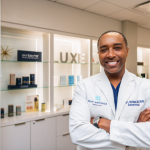By Je’Don Holloway-Talley
For The Birmingham Times
For Corey L. Hartman, M.D., dermatology is the perfect fusion of art and science.
“It has an artistic quality that I gravitate toward. I like working with my hands and doing things that actually involve procedures,” he said, explaining that his aim is to use dermatological procedures to enhance the natural aging process, not create an “overdone aesthetic.”
“I tell people ‘no’ [to procedures] all the time because I don’t want to contribute to that [overdone aesthetic]. I’m really honest with people, and I think that’s important in cosmetic work [because] we all see how people begin to look weird from doing too much stuff. I don’t want people walking around telling folks I made them look [weird],” said Hartman, who founded Skin Wellness Dermatology in 2009.
Hartman’s comprehensive practice, with Birmingham-area locations in Homewood and Greystone, is made up of dermatologists, certified registered nurse practitioners, certified physician assistants, and aestheticians.
As the summer comes to a close, the dermatology experts at Skin Wellness are preparing for one of their biggest events of the year: an open house, which will take place on September 21, from 4:30 to 7:30 p.m., at the Homewood office. At this gathering, representatives will be available to educate and advise guests about their specific dermatology goals and help with the start of a journey toward healthy skin.
“We see patients of all ages, and we cover pretty much all conditions,” said Hartman, who is board certified in dermatology. “We all have a focus that we take as our specialty and pride. I think the thing that sets us apart is that we know how to treat skin of all different types. We have people who are well versed in all [specialties], so [patients] can come here and know that everybody can do everything they need and not have to be concerned about somebody not understanding their particular skin type.”
Among Hartman’s focuses are “facial injectables; … lasers [and other] different devices to help with pigment, texture, and all things skin; and acne [treatments],” he said. “We keep people looking fresh and help them age as well as they can.”
His practice also offers hair-restoration treatments and services related to traction alopecia, a form of hair loss in which mechanical damage to the hair follicle is caused by repeated tension or pulling” according to the Skin of Color Society.
“Traction hair loss is an epidemic among Black women,” said Hartman. “As Black dermatologists, it’s something that all of us are always trying to work on [because we] know somebody who’s been affected. … It has become a bit of a passion project.”
“Destined for Greatness”
It’s no surprise that Hartman,48, would become one of the tops in his field. He grew up in a middle-class community in East New Orleans, Louisiana, surrounded by Black excellence.
“I would not trade that [upbringing] for anything because we all really wanted to see each other succeed,” he said. “We all were just automatically destined for greatness, and we all had each other’s backs. So, that was certainly a factor in my belief in myself and my motivation to achieve all of my goals and anything that I set out to do.”
“[We] encouraged each other,” he added. “If you were smart and Black, then you were either going to be a doctor or a lawyer. I already knew I liked science and art, so that is what drew me into medicine. My parents were certainly encouraging. They’ll have been married for 52 years in March. We have a culture of family and togetherness, and we come from a close-knit, Black middle-class community.”
Hartman’s mother and father, Leon and Olga Hartman, are also professionals. His mother is a retired human resource (HR) professional, who was an HR director for the state of Louisiana and a few nonprofits. His dad is a retired chemical engineer, who worked for the Union Carbide Corporation and then returned to the workforce as a Job Corps instructor, helping young people who had challenges in school.
“A lot of [students] didn’t have any father figures in their life, so he was a father to a lot of kids who never had anybody to look up to,” said the dermatologist.
Student of Medicine
Hartman aspired to become a dermatologist “since the age of 13 or 14,” he said.
“I had this incredible mentor as my neighbor, [Dr. Errol Quintal]. He was this icon in dermatology, the only Black dermatologist in the state of Louisiana, and he allowed me to get early access to see what it was all about. … He became a [professional] mentor to me, and he is still a friend to this day and encourages me now.”
In pursuit of his goal, Hartman earned a Bachelor of Arts degree in Psychology from Emory University, in Atlanta, Georgia, in 1997. He then attended Meharry Medical College, a historically black college and university (HBCU) in Nashville, Tennessee, where he earned a Doctor of Medicine degree in 2002. And he completed an internship in internal medicine at Tulane University Medical Center in New Orleans, Louisiana, in 2003.
He also trained and studied at the University of California, Los Angeles (UCLA), and Howard University, an HBCU in Washington, D.C., where he apprenticed under experts in cosmetics from 2003 to 2006. He then completed a residency in dermatology at the University of Alabama at Birmingham (UAB) Heersink School of Medicine, formerly the UAB School of Medicine, and joined the UAB faculty in 2006.
After a year in academic medicine, Hartmann realized that “it was not my cup of tea,” he said.
“I wasn’t really into the politics of academic medicine,” Hartmann added. “In academic medicine, they want you to be [a specific kind of expert], and that wasn’t really working for me. So, I went to a multispecialty group, [Southview Medical Group at Birmingham’s St. Vincent’s Ascension Hospital], where I really learned more about the [medical] business because you don’t really learn any of that as a resident or as a medical student. The multispecialty group was not ideal, either, [because] I knew I wanted to do my own thing. That’s when I started my own practice.”
Married to Medicine
Hartman is literally married to medicine. His wife, Erika B. Hartman, D.D.S., is co-owner and an orthodontist at Birmingham Orthodontics. The two doctors, who have two children—Grant, 14, and Helen, 11—met at Meharry and made a home in The Magic City, as they both had footprints here. Like her husband, Dr. Erika Hartman attended UAB, where she completed her undergraduate studies.
“We thought about going back to Atlanta, where I had [done my undergraduate work], but Atlanta is oversaturated with dermatologists. [Also], finding a house and then two different practices that didn’t put us on the road [commuting] for an hour every day was just going to be more work than we wanted to do,” said Hartman, who is a member of Alpha Phi Alpha Fraternity, Incorporated.
Though the Hartmans live and work in Birmingham, they often spend time in New Orleans.
“We still ride Madi Gras every year,” said East New Orleans native Hartman. “We go back, and the kids get a taste of that. We actually bought a condo last year, so that makes it a little easier. … We do a couple of balls, and we do ‘our’ Mardi Gras.”
Social Media Influence
One of the byproducts of a successful practice is that the doctor has become a social media star. On Instagram, Hartman’s personal page has more than 128,000 followers, and the Skin Wellness page has more than 18,000 followers. On TikTok, his videos average more than 500,000 views, and he has 62,600 followers. There are pros and cons to that type of social media presence because of the “lack of privacy and civility online,” Hartman said.
With those numbers, he often gives talks on social media marketing in medicine.
“I kind of stumbled into this [social media influence] by happenstance,” he added. “Everything kind of jumped out for me around 2018 or 2019, when I started sharing on Instagram, in particular. … It kind of morphed as I shared more information about dermatology.”
Also contributing to the influx of followers, Hartman believes, was the accurate information he shared and myth-busting he did during the COVID-19 pandemic in 2020.
“I think [some doctors] thought we were above [social media], like it was something that was not worthy of us and our education, so a lot of us didn’t participate [on social media],” he said. “[That created] a void, and people who don’t know what they were talking about started to fill those spaces, so we had all this misinformation. … Now, we all have to be on here because we have to dispel these myths and help people know what the real truth is.
“As far as what I post, I try to keep it honest, I try to keep it authentic, I try to keep it relevant and just give people a little bit of education, but nobody wants to be lectured to all the time. You have to keep it funny and keep it entertaining, and that’s what we do—have fun and entertain, and we just share that online.”
Asked about the feedback, Hartman mentioned two “flexes.”
“Two of the biggest compliments are a. You look the same in real life—that’s a huge, huge flex. I like that,” he laughed. “And b. You’re the same person [we see online]. What you see is what you’re going to get. I think it’s refreshing when [patients] come in and that wall has already been broken. They kind of know [who you are], and they get you. I always say, ‘As soon as this stops being fun, I’m going to stop doing it.’”
To learn more about, Skin Wellness Dermatology, visit www.skinwellness.com









